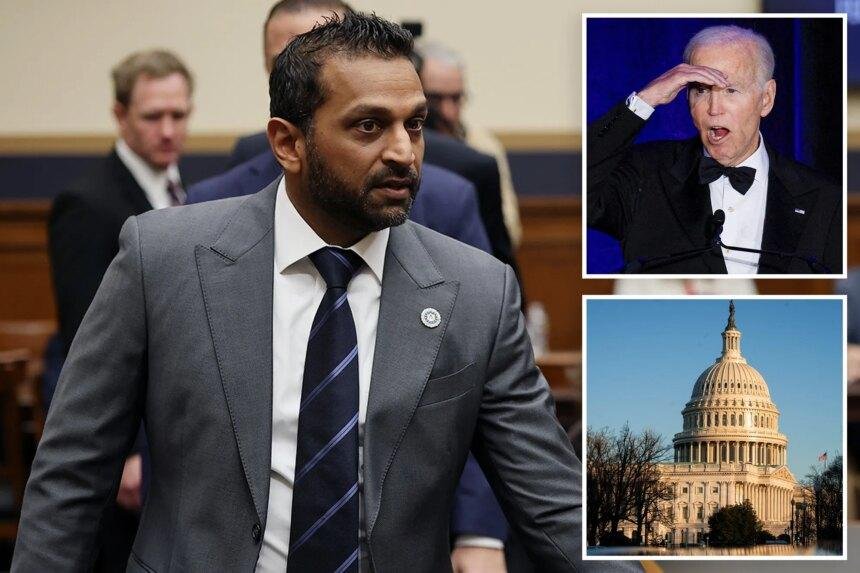FBI Disbands Controversial Unit Amid Allegations of Political Espionage
In a significant development, FBI Director Kash Patel announced the dismantling of a specialized unit that had been under scrutiny for allegedly tracking the communications of U.S. senators during the Biden administration. This decision marks a pivotal moment in the ongoing debate over the FBI’s role in political investigations and its relationship with elected officials.
The Dismantling of the CR-15 Unit
On Tuesday, Patel took to social media platform X to declare the end of the CR-15 squad, a unit within the FBI’s Washington Field Office. He stated, “They tracked the communications of GOP Senators. They weaponized law enforcement against the American people. That era is over.” Patel emphasized that the FBI had not only fired individuals who acted unethically but had also initiated an investigation into the unit’s activities. He framed this move as a commitment to transparency and accountability, asserting that these principles are not mere slogans but promises that have been fulfilled.
The CR-15 unit was one of three federal public corruption squads operating out of the FBI’s Washington Field Office. It played a crucial role in the “Arctic Frost” investigation, which was launched in April 2022 to examine alleged interference in the 2020 presidential election. This investigation was later taken over by former special counsel Jack Smith, who has been at the forefront of high-profile inquiries into election-related misconduct.
Background on the Arctic Frost Investigation
The Arctic Frost probe focused on efforts by former President Donald Trump and his allies to contest the 2020 election results. This included attempts to present an alternative slate of electors, a tactic that has raised significant legal and ethical questions. The CR-15 unit was reportedly involved in the investigation and was responsible for the arrest of White House aide Peter Navarro in 2022. Additionally, the squad obtained two phones belonging to Trump and former Vice President Mike Pence from Biden administration officials, further complicating the narrative surrounding the FBI’s actions during this politically charged period.
According to reports from NBC News, the CR-15 unit was effectively shut down in May, with agents being reassigned as part of a broader reorganization within the FBI. This restructuring appears to be a response to mounting criticism regarding the bureau’s handling of politically sensitive investigations.
Allegations of Espionage Against Senators
The announcement of the CR-15 unit’s disbandment comes on the heels of revelations made by Senator Chuck Grassley (R-Iowa). On Monday, Grassley disclosed a September 2023 FBI document indicating that the bureau had conducted a “preliminary toll analysis” on the phone records of eight sitting senators. The senators targeted included prominent GOP figures such as Lindsey Graham (R-SC), Bill Hagerty (R-Tenn.), and Josh Hawley (R-Mo.), among others. The document, which was lightly redacted, is labeled as a “SENSITIVE INVESTIGATIVE MATTER” related to the Arctic Frost investigation.
While the specific motivations behind the FBI’s surveillance of these lawmakers remain unclear, it is believed that the agency was collecting data on the timing and recipients of their calls rather than actively tapping their phones. This raises serious questions about the extent to which law enforcement can engage in surveillance of elected officials, particularly in a politically charged environment.
Political Repercussions and Ongoing Investigations
Grassley has expressed his determination to pursue further investigations into the FBI’s actions during the Biden administration. He stated, “If heads don’t roll in this town, nothing changes,” highlighting the urgency he feels regarding accountability within the bureau. The implications of these revelations extend beyond individual lawmakers; they touch on broader concerns about the FBI’s role in American democracy and its potential overreach in politically sensitive matters.
The CR-15 unit’s activities have drawn comparisons to past instances where law enforcement agencies have been accused of overstepping their bounds. Historical examples, such as the FBI’s surveillance of civil rights leaders in the 1960s, serve as cautionary tales about the potential for abuse of power in the name of national security or political stability.
The Broader Context of FBI Investigations
The FBI has long been a focal point in discussions about the intersection of law enforcement and politics. The agency’s mandate to investigate corruption and uphold the law often places it in contentious situations, particularly when political figures are involved. The Arctic Frost investigation and the actions of the CR-15 unit have reignited debates about the FBI’s impartiality and its ability to operate free from political influence.
As the political landscape continues to evolve, the implications of the FBI’s actions will likely remain a topic of intense scrutiny. The dismantling of the CR-15 unit may be seen as a step toward restoring public trust, but it also raises questions about the future of political investigations and the balance between accountability and oversight.
Conclusion
The disbanding of the FBI’s CR-15 unit marks a significant moment in the ongoing dialogue about the agency’s role in American politics. As allegations of political espionage surface, the need for transparency and accountability within law enforcement becomes increasingly critical. The actions taken by the FBI in the coming months will be closely watched, as they will not only impact the agency’s reputation but also shape the future of political investigations in the United States. The balance between national security and the rights of elected officials remains a delicate one, and the fallout from this incident will likely reverberate through the political landscape for years to come.








